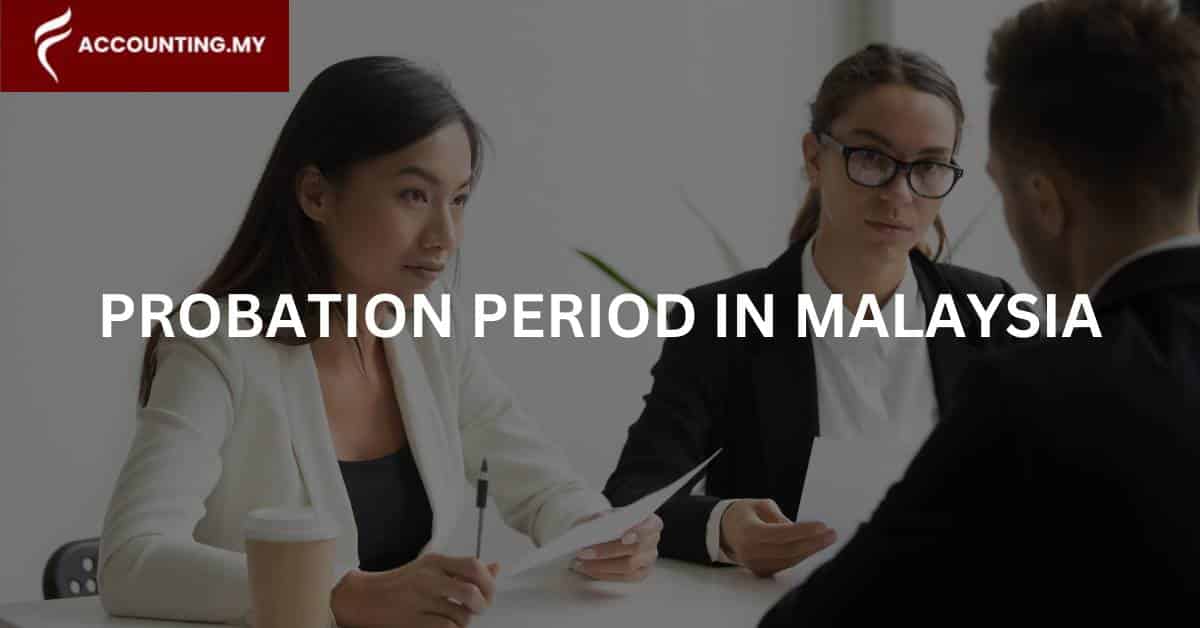Key Takeaways
- Probation periods typically last 3 to 6 months under Malaysian employment contracts.
- Employees on probation have fewer protections, but dismissal must still be fair and justified.
- Employers must give written notice or pay in lieu to terminate probationers.
- Probation can be extended, but not indefinitely or without clear reasons.
- Confirmation letters signal permanent employment, they’re not automatic upon completion.
A probation period in Malaysia is a trial phase, usually 3–6 months, during which an employee’s suitability is evaluated before permanent confirmation.
You’ve signed the offer, maybe even started your onboarding. But until you get that confirmation letter, you’re technically still on trial, and everyone knows it.
Whether you’re the one managing hires as part of your HR or accounting function, or the fresh grad nervously watching the calendar tick down, probation periods in Malaysia come with both opportunities and risks.
This guide breaks down everything you need to know about how probation works, including notice periods, termination rights, confirmation procedures, and what the law really says.
Comparison Table: Probation vs Confirmed Employment
Feature | Probationary Employee | Confirmed Employee |
Legal Protection | Limited, but still protected | Full rights under EA 1955 |
Notice Period | Shorter (often 1 week – 1 month) | Based on contract or law |
Termination Requirements | Must be justified; no due inquiry needed | Requires show-cause + domestic inquiry |
Benefits | Basic statutory only (EPF, SOCSO) | Full company benefits may apply |
Confirmation Letter | Not automatic | Usually issued after evaluation |
What Does ‘Probation Period’ Mean in Malaysian Employment?
A probation period is a trial phase in a job contract where an employee is evaluated before being confirmed as permanent staff.
- In Malaysia, this is a standard part of most employment contracts, especially for full-time roles.
- It gives employers a chance to assess your work performance, punctuality, teamwork, and cultural fit.
- For employees, it’s also a chance to evaluate the job, environment, and whether expectations match reality.
How Long Does It Last?
- Most probation periods range from 3 to 6 months.
- Some high-level roles (senior management or specialised technical positions) may have longer terms, up to 12 months.
- The exact duration must be clearly stated in the employment contract.
What Governs the Probation Period?
While probation is not mandatory under Malaysian labour law, it is recognised through:
- Employment contracts (Sdn Bhd, GLCs, and even SMEs)
- Case law precedents and Industrial Court rulings
- Fair treatment principles under the Employment Act 1955 (especially post-2023 amendments)
“Probation is not a free pass to fire someone at will. Employers must still act in good faith.” – HR Consultant from Accounting.my
Where Is It Used?
Probation clauses are common in virtually all sectors:
- Corporate roles (admin, finance, HR)
- Retail & customer service
- Technical/engineering fields
- Healthcare & education
It applies to locals and foreign employees alike, as long as they are on a contract of service (not freelance).
For Jobseekers: Watch for This
If you’re starting your first job or switching industries, always check:
- Is there a written probation clause?
- Are your notice periods and benefits clearly defined during probation?
- Is there an evaluation timeline or review meeting mentioned?
If anything is unclear, ask HR before signing. Unwritten assumptions are a leading cause of disputes brought to the Industrial Court.
What Rights Do Probationary Employees Have in Malaysia?
Even during probation, employees in Malaysia are protected by law, especially under the Employment Act and statutory benefit systems.
Probation does not mean “no rights.” While company perks (bonuses, medical cards) may be withheld until confirmation, you are still entitled to core legal protections and contributions from day one.
This means your employer must still:
- Provide written notice before termination
- Make EPF, SOCSO, and EIS contributions
- Honour statutory leave entitlements (see below)
Even employees not covered by the Act may still file claims under general contract law or via the Industrial Court.
What Leave Are Probationers Entitled to?
Leave Type | Entitlement (First Year) |
Minimum 8 days, pro-rated based on service | |
Sick Leave | 14 days if employed under 2 years |
Maternity Leave | 98 days, if eligible and properly notified |
Paternity Leave | Optional, varies by company policy |
Important Note: Leave is usually pro-rated during probation, check your contract or handbook for exact calculations.
What Contributions Must Employers Make?
Take note bosses and employers, probationers must receive full statutory contributions from Day 1:
- EPF (Employee Provident Fund)
- SOCSO (Social Security Organisation)
- EIS (Employment Insurance System)
- PCB Tax Deductions if eligible
These are non-negotiable, even if you’re on a short-term or 3-month probation.
Can Employers Terminate Probationary Employees in Malaysia?
Many assume employers can fire probationers at will. But under Malaysian employment law and Industrial Court rulings, probationers still have legal protection. Termination cannot be arbitrary or discriminatory, and employees have the right to challenge it.
Employers must prove the decision was not made in bad faith. Acceptable grounds include:
- Consistent poor performance despite training or coaching
- Failure to meet clearly communicated KPIs or expectations
- Misconduct, such as repeated tardiness or breach of conduct
- Incompatibility with team or inability to follow instructions
Dismissal due to personality differences, minor mistakes, or discriminatory reasons (ethnicity, age, gender, pregnancy) is not valid under law.
What Process Should Employers Follow?
While simpler than for confirmed employees, the following steps are strongly recommended:
- Set expectations early during onboarding or orientation
- Monitor and document performance or behavioural issues
- Issue warning(s) verbal, followed by written show-cause or performance memo
- Provide opportunity to improve, even if informally
- Notify in writing with a reasoned termination letter
This not only supports fairness, it protects the employer from legal disputes.
Can a Probationer File for Unfair Dismissal?
Under the Industrial Relations Act 1967, any employee including probationers, can lodge a complaint if:
- They believe they were unfairly dismissed
- The dismissal was based on discrimination, bad faith, or no justification
- No opportunity was given to respond to alleged shortcomings
If successful, the Industrial Court may award compensation (typically back wages and damages) or, in rare cases, reinstatement.
If you’re a probationer and receive a termination notice, request your termination reason in writing. If it’s vague, misleading, or unfair, you may have grounds to file a claim with the Jabatan Perhubungan Perusahaan.
Can a Probation Period Be Extended Legally?
Malaysian employers may extend a probation period, but only with valid justification and proper written notice to the employee.
Remember, probation is not an open-ended status and extensions are allowed when clearly necessary, but must be communicated transparently and handled fairly, or employers risk facing a claim of constructive dismissal.
When Is It Reasonable to Extend Probation?
Employers typically extend probation for the following legitimate and legally acceptable reasons:
- The employee shows potential, but performance hasn’t met all key expectations (Make sure to clarify this in the onboarding process)
- The review or appraisal was delayed (manager on leave or structural changes)
- The employee had significant absences (medical leave or emergency time-off)
- The role or KPIs shifted mid-probation and time is needed to re-assess
What Should the Extension Letter Include?
Yes, employers need to give a written probation extension letter if they deemed it necessary to extend the probationary period. In fact, it should clearly state:
- New end date of the probation period (1 or 3 months more)
- Reason for the extension (performance, absence, review delay)
- Specific expectations for the next phase such as improve punctuality, meet KPI targets
- Clarification that confirmation is not yet granted
Verbal extensions or “silent” extensions with no documentation can be challenged legally and are often viewed as bad HR practice.
What If the Employer Keeps Extending It?
This situation is not unheard of and for good reason.
Unscrupulous employers sometimes extend probation repeatedly to delay confirmation, withhold benefits, or avoid long-term commitments.
- It can be viewed as bad faith or unfair labour practice.
- Industrial Court cases have ruled that employees working beyond their original probation term without proper notice may be considered de facto confirmed.
- Prolonged extensions without performance evaluations or feedback erode trust and morale.
For Employers: If you genuinely need more time to assess, be transparent. Clearly state the reason for the extension, define what success looks like, and give the employee a fair chance to meet it. A win-win for everyone.
What Happens After the Probation Period Ends?
A surprising number of employees assume that finishing the 3 or 6 month term means they’re now permanent staff.
But under Malaysian employment practice, confirmation must be clearly communicated, either through a letter or an official HR notice.
At the end of your probation period, your employer should:
- Conduct a final performance review or appraisal
- Decide whether to confirm, extend, or terminate your employment
- Issue a confirmation letter, extension letter, or termination notice
Best practice: This decision should be made and communicated on or before the last day of probation.
What If There’s No Letter or Feedback?
Okay, this is where things get grey.
For employees, if you:
- Continue working in your same role
- Receive no feedback or written notice
- Are paid the same salary and treated like other confirmed staff
Then legally, you may be considered confirmed by conduct, even without a formal letter.
“The Industrial Court has ruled that silence from the employer, combined with uninterrupted service, may imply confirmation.”
What Should Employers Avoid?
- Delaying feedback or letters without reason
- Letting employees continue indefinitely in limbo
- Failing to document confirmation or extension decisions
This creates uncertainty, invites disputes, and weakens the employer’s position if challenged later.
Do All Companies Do It the Same Way?
No. Some companies:
- Conduct structured HR-led exit reviews
- Use automated systems to trigger confirmation letters
- Delay confirmation for payroll or restructuring reasons (not ideal)
Others still handle it manually or forget entirely, so don’t be that boss yeah?
For Employees: If you’ve passed your probation period and haven’t received a letter within 7 working days, follow up politely with HR or your manager. Clarify benefits for both sides, always aim for a win-win resolution.
What Should Be in a Probation Clause?
A probation clause should clearly state duration, termination notice period, extension terms, and benefits entitlement.
Checklist-style bullets:
- Probation length (3 months)
- Employer right to extend
- Shorter notice period
- Confirmation upon written notice only
- Benefits during probation
Conclusion: Setting Fair & Clear Probation Periods in Malaysia
Probation is more than a formality, it defines how trust, performance, and expectations are built from Day 1.
Whether you’re crafting contracts or navigating your first job offer, clarity on rights, timelines, and responsibilities protects both sides.
At Accounting.my, we help employers structure fair, legally sound probation policies, and guide employees on what to expect.
Need help reviewing your probation clause or HR payroll contract terms? Talk to us, we’ll keep it compliant and crystal clear.
Frequently Asked Questions About Probation Period Malaysia
A trial period, usually 3–6 months, for evaluating new employees before confirming them permanently.
No. Termination must be justified, though a formal inquiry isn't required like for confirmed staff.
No. A confirmation letter is required unless implied through continued work and benefits.
Only with justifiable cause. Multiple extensions without reason may be deemed unfair.
Basic statutory benefits like EPF and SOCSO are still required; others depend on the employer.
Usually shorter (1 week to 1 month), but must be stated in the employment contract.















